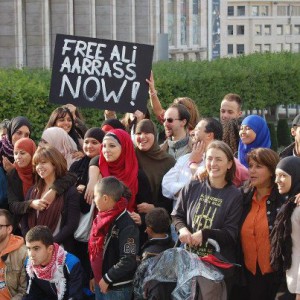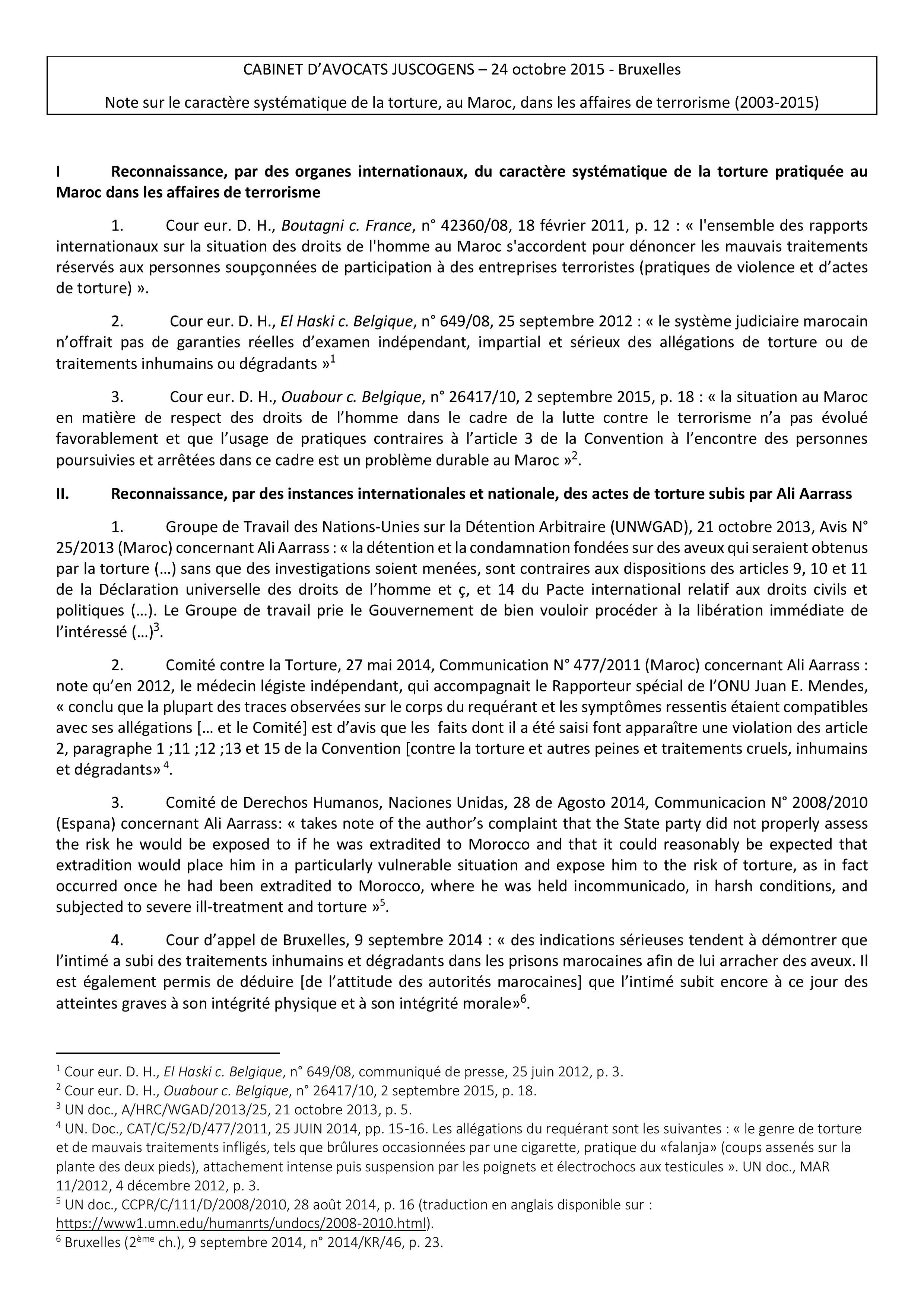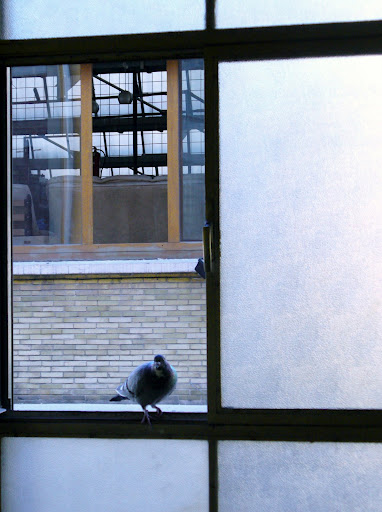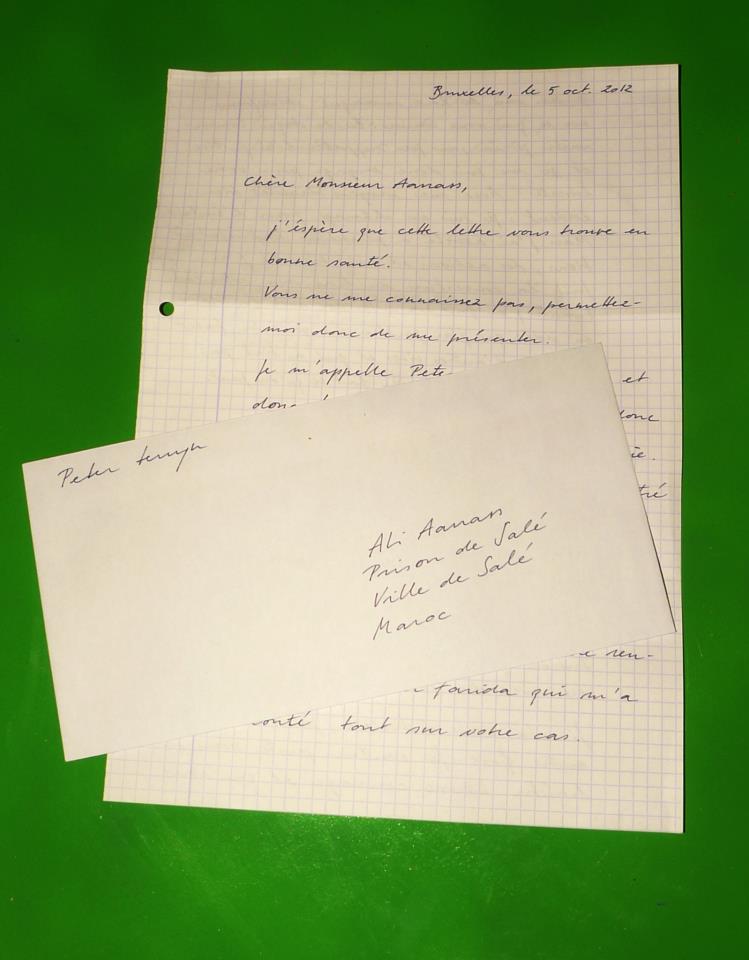The appeal of Ali Aarrass has finally been heard, and the judges have delivered their verdict: the conviction stands, although the sentence is reduced from fifteen years to twelve.
On 24 September, a forty-strong international delegation of lawyers, scholars, human rights activists, journalists and film-makers gathered at the Appeal Court at Rabat-Salé with members of Ali Aarrass’ family including his wife, sister, brothers, nephews and uncles to hear Ali’s long-awaited and frequently adjourned appeal. The London delegation was strengthened by the presence of Professor Penny Green, head of the International State Crimes Initiative (ISCI) at Kings College, as well as Liz Fekete, executive director of the Institute of Race Relations, Arnaud Mafille of Cageprisoners and myself. The delegation from Belgium included Marc Nève, a distinguished lawyer, jurist and former vice-chair of the Council of Europe’s Committee for the Prevention of Torture (CPT), and from France, jurist and former Green MEP Alima Boumediene-Thiery joined us. Film-makers and journalists from Spain, the UK and the Netherlands also attended, and Ali’s defence team incuded lawyers from Belgium and Morocco. 
UN Special Rapporteur on Torture Juan Mendez visited Ali in prison days prior to the September hearing. As a result of the meeting, Ali was threatened by prison staff and family members’ visits were obstructed, and security police also harassed those taking photographs outside the prison on the day of the appeal hearing. But Mendez’s public condemnation of the continuing use of torture to extract confessions during incommunicado detention as he left Morocco gave a fillip to Ali’s case.
During the hearing, Ali’s lawyers presented the judges with damning evidence of the illegality of the whole extradition and trial process, including that the charges bore no relation to those in the extradition warrant; the investigation into Ali’s claims of torture was tardy and perfunctory and breached UN standards; key evidence was withheld from Ali’s lawyers at the original trial; and Ali was never granted free, private access to his lawyers.
After a five-hour hearing, the case was adjourned until Monday 1 October, when Ali was to testify about his treatment in custody. Despite the short notice for the adjourned hearing, a further delegation including specialist in international human rights law Thomas McManus from ISCI, as well as advocates, supporters, family and friends from Belgium and Melilla made the journey.
The hearing on 1 October ended in disappointment, as the judges of the Salé Court of Appeal allowed Ali’s conviction to stand, merely reducing his sentence from fifteen to twelve years’ imprisonment, after refusing defence requests to order a proper investigation into his alleged torture and without even taking the time to examine or respond to the questions raised by the defence.
Questioned by the court, Ali tried to describe the torture he had been subjected to – and the judges refused to hear his account, stopping him just as he was explaining how he had been tied to a tree and beaten until he lost consciousness. After a short prosecution summing-up notable for its failure to address any of the defence arguments, Ali’s lawyers summed up his case, in front of judges who demonstrated their impatience to have done with the affair. The failed to maintain even the appearance of a fair hearing. Two of the judges were obviously sleeping, while the presiding judge was consulting his mobile phone. The president indicated that he did not need the prosecutor to respond to the final arguments of the defence. After deliberating for little more than an hour, the judges returned with the unsurprising decision to sentence Ali to twelve years, not interfering with the conviction despite the UN Special Rapporteur’s condemnation of Morocco just a week earlier for judges’ acceptance of evidence obtained by torture.The overwhelming impression given by the judges at the hearing was that they did not want to listen, since they had made their decision even before the hearing.
An urgent petition had been sent to the UN Committee Against Torture seeking an order that the Moroccan authorities mount an independent investigation of the torture allegations made by Ali Aarrass. But in the absence of a response from the Committee, the verdict of the court was a forgone conclusion.
This new setback only enhances the determination of Ali Aarrass, his family, his supporters and his legal team to carry on the fight for justice. An appeal to the Court of Cassation will be lodged in the next few days and the battle will continue for an independent inquiry into the allegations of torture. Meanwhile, the complaints against Morocco and Spain to the UN human rights and torture committees are still being pursued.
The campaign also plans to put pressure on the Belgian government for its failure to intervene or to provide any consular assistance whatsoever to one of its own nationals.
For a fuller briefing on Ali Aarrass’ case go to http://www.freeali.be.
The fight for justice for Ali Aarrass is the fight for accountability of governments, for obedience to the rule of law, and for equal civil and human rights for all Muslim European citizens. But the legal and travel costs for the family are huge, and they really need financial help from activists and sympathisers.
To help support Ali Aarrass in his fight for justice please send money to the Friends of Ali Aarrass (sort code: 089299, account number 65583960).






